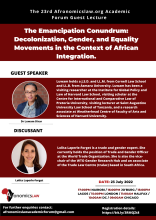Call for Papers - Edited Book: Multidisciplinary Perspectives on Land Use Regimes under the AfCFTA
The co-editors, Chidebe Nwankwo, Sikelela Ndlazi, and Angelo Dube, invite contributions to an edited volume entitled ‘Multidisciplinary Perspectives on Land Use Regumes under the AfCFTA.” The volume seeks to catalogue the prospects and challenges of extant land use regimes in African states towards actualizing the objectives of the anticipated single market. The goal of the volume is to offer fresh insight from multidisciplinary perspectives on the historical, institutional, political, and legal and policy dimensions of land and the sustainable development of the member states under the AfCFTA.
